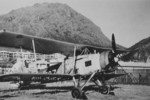Swordfish
| Country | United Kingdom |
| Manufacturer | Fairey Aviation |
| Primary Role | Torpedo Bomber |
| Maiden Flight | 17 April 1934 |
Contributor: C. Peter Chen
ww2dbaseThe Swordfish torpedo bombers were biplanes constructed with metal frames covered in fabric. The design also called for folding wings so they could be launched from carriers. They entered service with Britain's Fleet Air Arm in 1936, replacing the Seal torpedo bombers also made by Fairey Aviation. By 1939, however, the Swordfish aircraft were already obsolete. Nevertheless, they remained in use throughout the fleet as torpedo bombers and reconnaissance aircraft. While they served with relative success on the Norwegian coast in 1940 and in the Battle of the Atlantic, they achieve their fame during the 11 Nov 1940 attack on Taranto. 21 Swordfish aircraft in two waves caught six Italian battleships, nine cruisers, and eight destroyers completely off guard at Taranto. The battleship Conte di Cavour was sunk in harbor, the battleship Littorio suffered three torpedo hits, and the battleship Caio Diulio suffered one torpedo hit. The heavy cruiser Trento received heavy damage, along with several destroyers badly hurt. Shore facilities were damaged as well. Their luck turned, though, when six of them conducted a strike on German battlecruisers dashing through the English Channel in Feb 1942; all six were lost without inflicting any significant damage. When the Barracuda torpedo bombers entered service in Jan 1943, Swordfish aircraft were finally removed from front line duties, though they continued to be in production and in service until 1945. The last Swordfish was delivered in Aug 1944, the last of 2,392 aircraft. They remained in service with training squadrons until summer of 1946.
ww2dbaseSource: Wikipedia.
Last Major Revision: Mar 2007
Swordfish Timeline
| 17 Apr 1934 | The Fairey Swordfish Torpedo bomber took flight for the first time. |
SPECIFICATIONS
Swordfish
| Machinery | One Bristol Pegasus IIIM.3 rated at 690hp or Bristol Pegasus XXX radial engine rated at 750hp |
| Armament | 2x7.7mm Vickers machine guns, 1x760kg torpedo or 1x700kg mine, 8x27kg rockets |
| Crew | 3 |
| Span | 13.87 m |
| Length | 10.87 m |
| Height | 3.76 m |
| Wing Area | 50.40 m² |
| Weight, Empty | 1,900 kg |
| Weight, Loaded | 3,500 kg |
| Speed, Maximum | 222 km/h |
| Rate of Climb | 6.20 m/s |
| Service Ceiling | 5,870 m |
| Range, Normal | 879 km |
| Range, Maximum | 1,650 km |
Photographs
 |  |  |  |
Please consider supporting us on Patreon. Even $1 per month will go a long way! Thank you. Please help us spread the word: Stay updated with WW2DB: |
Visitor Submitted Comments
2 Sep 2007 01:00:14 AM
Lieutenant Commander Esmonde, a veteran of the attack on the Bismarck, would later be awarded a posthumous Victoria Cross for his bravery and leadership under fire during the suicidal attack on Scharnhorst, Gneisenau and Prinz Eugen in February 1942. Only five airmen, from eighteen, survived from this attack.
13 Sep 2007 06:23:09 AM
Two Stringbags are still airworthy with the FAA Memorial flight.
29 Nov 2007 05:19:11 AM
Introduced in 1943, the Swordfish Mk.II introduced a strengthened lower wing, metal skin under-surfaces and a rocket projectile capability. A total of 1,080 Swordfish Mk.II were built by Blackburn at the new Brough factory in Yorkshire. Ninety-nine Mk.IIs were delivered to the Royal Canadian Navy.
31 Aug 2009 02:57:33 PM
The Swordfish stayed in front line service until the end of the European war in May 45 as an Anti- Submarine- Warfare aircraft. In this role it is credited with sinking or aiding in the sinking of 21 German U-boats
14 Oct 2013 04:38:25 PM
the Swordfish is the most overlooked plane of WW2. it out lived it's replacement. the battle of the Atlantic would have been much more costly with out it. And did serious damage to many capital ships. It even forced the Tirpitz to run back to it's base in Norway.
14 Oct 2013 05:08:57 PM
they also took part in the Raid on Bomba. 21 August 1940. 3 Swordfish with 3 torpedo's sank 2 submarines 1 sub-tender and a Destroyer. they where on loan to the Western Desert Force from HMS. Eagle. flying out of Sidi Barrani.
20 Aug 2021 10:42:03 AM
no the most overlooked plane is the other vershon of the do-17 wich it was powerd by biplane motors
All visitor submitted comments are opinions of those making the submissions and do not reflect views of WW2DB.
» Stan Laurie
Notable Events:
» Attack on Taranto
» Battle of Denmark Strait
Related Document:
» Carrier Aircraft Specifications
- » 1,167 biographies
- » 337 events
- » 44,606 timeline entries
- » 1,243 ships
- » 350 aircraft models
- » 207 vehicle models
- » 376 weapon models
- » 123 historical documents
- » 261 facilities
- » 470 book reviews
- » 28,499 photos
- » 365 maps
Lt. Gen. Lewis B. "Chesty" Puller, at Guadalcanal
Please consider supporting us on Patreon. Even $1 a month will go a long way. Thank you!
Or, please support us by purchasing some WW2DB merchandise at TeeSpring, Thank you!
16 Mar 2007 11:52:48 AM
You forgot to mention how several of these damaged the German flagship Bismarck after it sank HMS Hood.